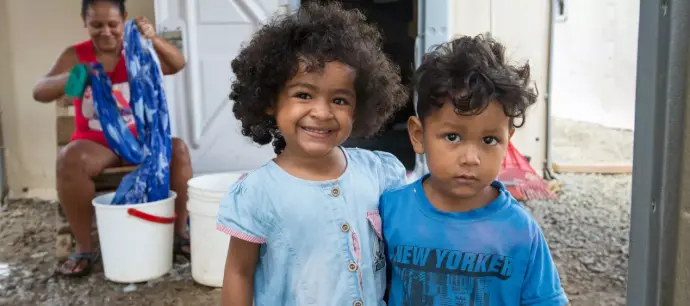Nameless children in the world's most dangerous jungle
Migrating without a name, identity, or nationality: at risk of statelessness

At the San Vicente Immigration Reception Station on the border between Colombia and Panama, five families with children without names, nationality, or identity experienced the difficulties of migrating at risk of statelessness.
When Thiago was born, Gianleidy, his mother, held him close to her. She examined him completely. Hands, feet, everything was there. She left the health center with all her belongings and her baby in her arms. She received a document certifying that her son had been born alive. That same week, she traveled several kilometers by bus and on foot to obtain her son's ID, but she only had a copy of his ID, and accessing this document in her native Venezuela is now a daunting task. Without his ID, Gianleidy was unable to register her son. Despite several attempts, Thiago, like thousands of other children around the world, is finally growing up without a name or nationality; he has become invisible.
But for Gianleidy, Antonieta, Briannis, Miguel, and Miriam, migrant parents heading to North America with their families, their sons and daughters are real. They have names; they exist. They kiss them, hug them, get sick, laugh, and celebrate their birthdays.
It is for their children, all under the age of 5, that these parents decided to cross the dreaded Darién jungle, with all the fear, but also with all the hope, in search of a better life. A life where their children can go to school, access quality healthcare, and fulfill their dreams.
Surviving the jungle is just another step in their journey that began years ago when they left their native Venezuela to travel through South America. Upon arriving at one of the Immigration Reception Stations in the Darién Province (through which, according to the National Immigration Service (SNM), more than 227,000 people, including more than 36,000 children and adolescents, have passed during 2022), each person is individually verified by the National Immigration Service and the National Border Service, requesting their identification document. The families did not have their children's identification, so the child protection protocol was activated, which seeks to prevent human trafficking. They were referred to the National Secretariat for Children, Adolescents, and Family (SENNIAF), the authority responsible for protecting and guaranteeing the rights of children and adolescents in Panama.
SENNIAF officials conducted interviews, reviewed their situation, and ultimately decided to verify the kinship between parents and children through DNA testing. The process was complex because Darién is a remote area with limitations in guaranteeing this type of procedure. Some families waited almost four months for the results, hoping that this confirmation would help them obtain identification for their children. However, despite corroborating their parentage, all other efforts were in vain. SENNIAF contacted the children's countries of birth to request recognition of their nationality; however, legislative barriers remained as an impediment to registering the children with their consulates.
A long and exhausting process
Margarita Sánchez, UNICEF's Emergency Child Protection Officer in Panama, who since 2019 has been responsible for supporting migrant families with children once they leave the jungle after 10 arduous days of work, explained that this year is the first time that cases of children at risk of statelessness have been identified. Statelessness is the condition in which a person has not been legally recognized by a State, and therefore lacks documents certifying their identity, name, or nationality, which are rights protected by the Convention on the Rights of the Child. Without identity, children also lack access to rights such as health, education, and social protection, among others.
“The migrant parents are originally from Venezuela who initially emigrated to different South American countries where they had their babies. However, various reasons, including their irregular immigration status, lack of resources, legal advice, and support from the authorities, made it impossible for them to register their children in the registry offices of their countries of birth.”
The biggest obstacle to registration has been administrative, the UNICEF official added. “In all cases, the authorities required the parents to provide their original identification documents to register their children, but none of the mothers had their original ID or passport.”
The mothers only have a Certificate of Live Birth (CNV), but this document does not definitively prove the family relationship because it does not bear the child's name and is only used to register the baby in civil registry offices in the country of birth. In Panama, to certify the relationship and rule out any case of child trafficking, SENNIAF ordered a DNA test.
Since these cases were identified, UNICEF has supported the State and the families, advocating for the children's access to their rights and providing day-to-day support while their situation was being determined. The process of managing such exceptional cases required learning from the Panamanian government, the diplomatic delegations of the children's countries of origin, and UNICEF child protection specialists in the region. There were moments of hope when it seemed the children would obtain their documents, but after four months of coming and going, they continued their journey at risk of statelessness.
